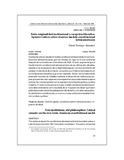| dc.rights.license | http://creativecommons.org/licenses/by-nc-sa/3.0/ve/ | |
| dc.contributor.author | Restrepo Amariles, David | |
| dc.date.accessioned | 2010-03-23T16:01:04Z | |
| dc.date.available | 2010-03-23T16:01:04Z | |
| dc.date.issued | 2009-06-30 | |
| dc.identifier.issn | 1856-349X | |
| dc.identifier.uri | http://www.saber.ula.ve/handle/123456789/30713 | |
| dc.description.abstract | El presente artículo estudia elmodelo constitucional desarrollado en lasConstituciones
latinoamericanas que han entrado en vigor en el sub-continente
después de la Constitución Colombiana de 1991. El autor argumenta que la
transformación constitucional latinoamericana de las últimas dos décadas,
basada en la recuperación de la legitimidad popular y el reconocimiento del
carácter multicultural de la nación, encuentra sus límites emancipatorios en
los fundamentos filosóficos que la han inspirado. Si bien, las Constituciones
pretenden refundar los Estados mediante el desarrollo de instituciones propias
que permitan abrir espacios emancipatorios clausurados desde la época
colonial, lasmismas también son la expresión de la filosofía política y jurídica
moderna. El autor concluye que el nuevo modelo constitucional latinoamericano
debe entenderse como resultado de la “migración de ideas” que hacen
parte del proceso actual de globalización del derecho, y en este caso particular
del derecho constitucional, y no como un caso exitoso de autodeterminación
jurídica y política. | es_VE |
| dc.language.iso | es | es_VE |
| dc.publisher | SABER ULA | es_VE |
| dc.rights | info:eu-repo/semantics/openAccess | |
| dc.subject | Derecho global | es_VE |
| dc.subject | Constitucionalismo latinoamericano | es_VE |
| dc.subject | Migración de ideas | es_VE |
| dc.title | Entre originalidad institucional y recepción filosófica: Apuntes críticos sobre el nuevo modelo constitucional latinoamericano | es_VE |
| dc.title.alternative | New institutions, old philosophies: Critical remarks on the new Latin American constitucional model | es_VE |
| dc.type | info:eu-repo/semantics/article | |
| dc.description.abstract1 | This article analyzes the constitutional developments that have taken place in
LatinAmerica since the 1991 Colombian constitution. The author shows that
the constitutional transformation undergone during the last 20 years focuses
on the recovery of popular sovereignty and the recognition of cultural diversity
within the nation. Consequently, he argues that emancipation is unachievable
through these three elements incorporated in the recent Latin American
constitutions because they are limited by their own philosophical assumptions.
The author claims that institutional arrangements set up in the newconstitutions
with the aim of achieving social emancipation from the colonial constitutional
legacy, are themselves deeply grounded in the European and modern
philosophical tradition of law and politics. Hence, the author concludes the
new LatinAmerican constitutions are to be seen as the result of the “migration
of ideas” within the frame of legal globalization, rather than as a successful
case of political and legal self-determination. | es_VE |
| dc.description.colacion | 39-64 | es_VE |
| dc.description.email | david.restrepo@ulb.ac.be | es_VE |
| dc.identifier.depositolegal | 07620053303358 | |
| dc.publisher.pais | Venezuela | es_VE |
| dc.subject.centroinvestigacion | Centro de Estudios de Fronteras e Integración (CEFI) | |
| dc.subject.facultad | Núcleo Táchira (NUTULA) | es_VE |
| dc.subject.keywords | Global law | es_VE |
| dc.subject.keywords | Latin-American constitutionalism | es_VE |
| dc.subject.keywords | Migration of ideas | es_VE |
| dc.subject.publicacionelectronica | Cuadernos sobre Relaciones Internacionales, Regionalismo y Desarrollo | |
| dc.subject.seccion | Cuadernos sobre Relaciones Internacionales, Regionalismo y Desarrollo: Artículos | es_VE |
| dc.subject.thematiccategory | Ciencias Económicas y Sociales | es_VE |
| dc.subject.thematiccategory | Ciencias Jurídicas y Políticas | es_VE |
| dc.subject.tipo | Revistas | es_VE |
| dc.type.media | Texto | es_VE |



